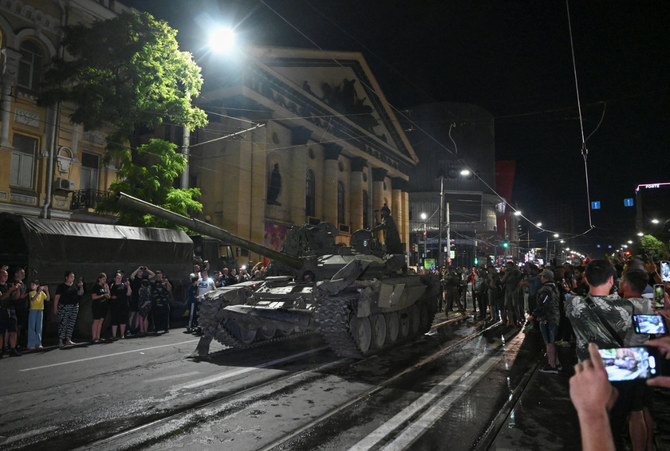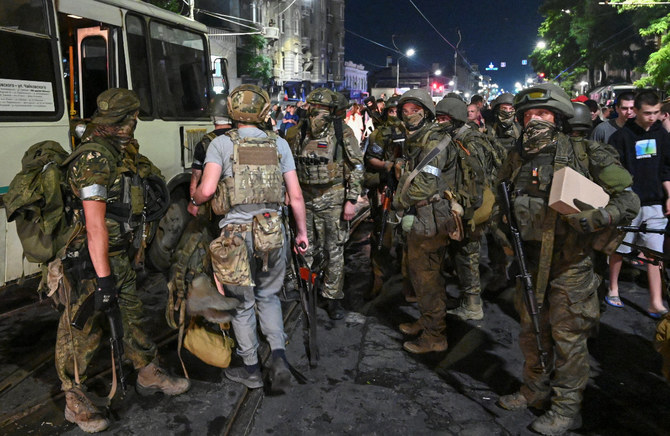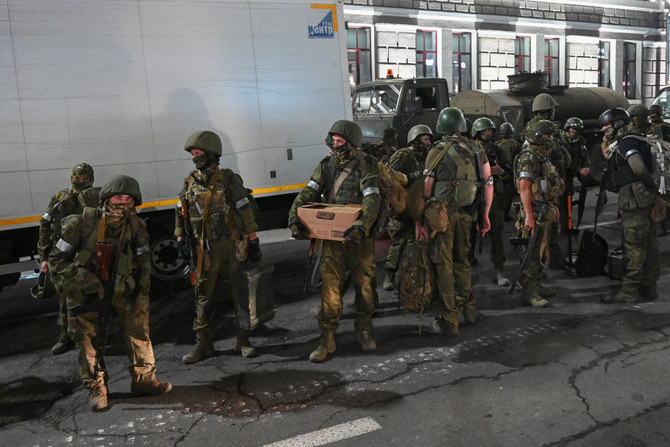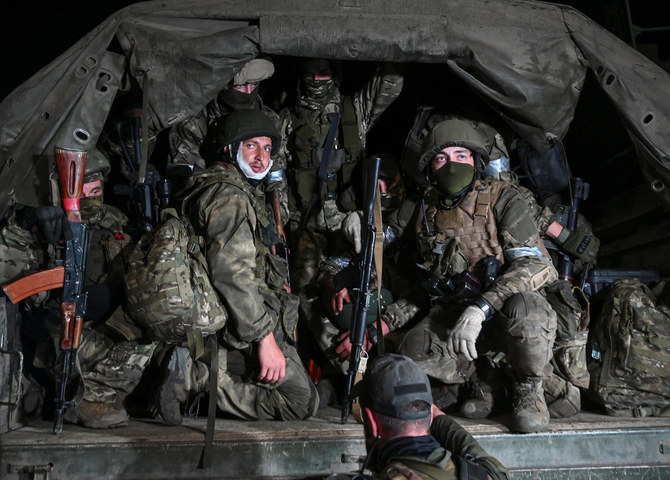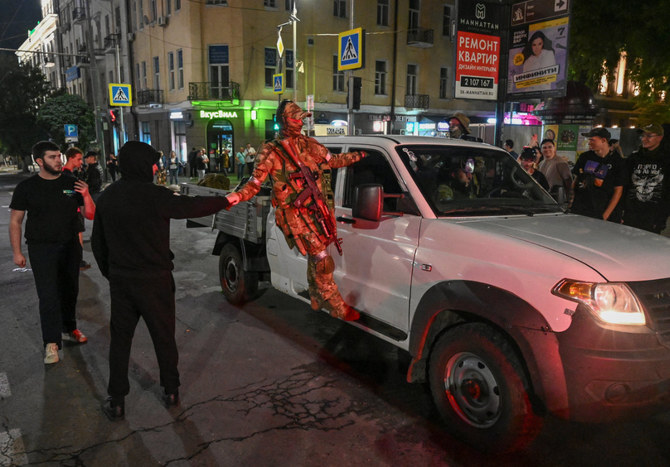The rebellious Russian mercenary commander who ordered his troops to march on Moscow before abruptly reversing course will move to neighboring Belarus and not face prosecution, the Kremlin said Saturday, as part of a deal to defuse a crisis that represented the most significant challenge to President Vladimir Putin in his more than two decades in power.
The charges against Yevgeny Prigozhin for mounting an armed rebellion will be dropped and the troops who joined him also will not be prosecuted, Kremlin spokesman Dmitry Peskov announced, and fighters from his Wagner Group who did not take part in the uprising will be offered contracts by the Defense Ministry.
Putin had vowed to punish those behind the armed uprising led by his onetime protege, whose forces seized a key military facility in southern Russia before advancing on the capital. In a televised speech to the nation, Putin called the rebellion a “betrayal” and “treason.”
In allowing Prigozhin and his forces to go free, Peskov said Putin’s “highest goal” was “to avoid bloodshed and internal confrontation with unpredictable results.”
Moscow had braced for the arrival of the Wagner forces by erecting checkpoints with armored vehicles and troops on the city’s southern edge. Red Square was shut down, and the mayor urged motorists to stay off some roads.
But after the deal was struck, Prigozhin announced that while his men were just 200 kilometers (120 miles) from Moscow, he had decided to retreat to avoid “shedding Russian blood.” His troops were ordered back to their field camps in Ukraine, where they have been fighting alongside Russian regular soldiers.
Prigozhin has demanded the ouster of Defense Minister Sergei Shoigu, long the target of his withering criticism for his conduct of the war in Ukraine. On Friday, he accused forces under Shoigu’s command of attacking Wagner camps and killing “a huge number of our comrades.”
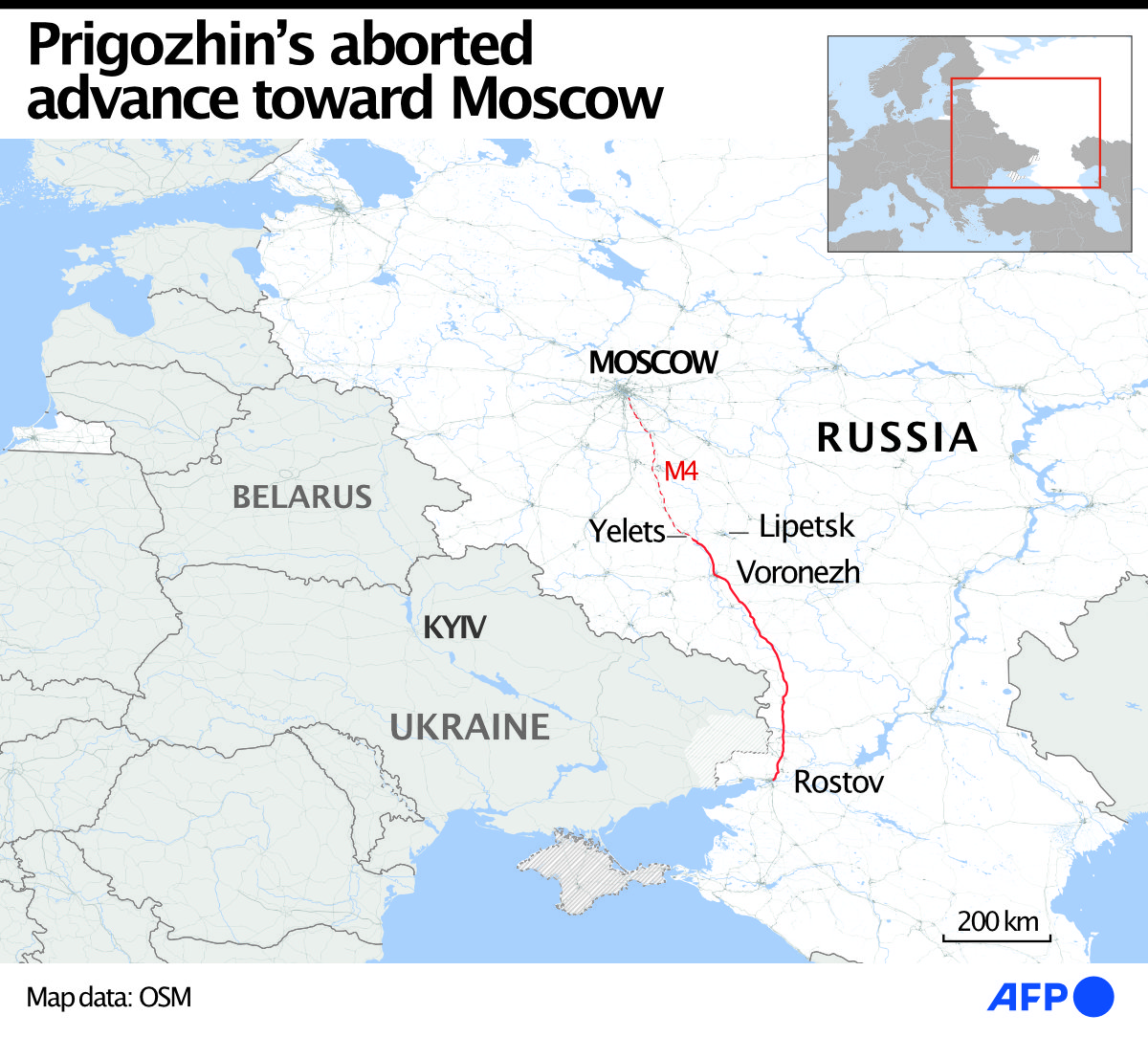
Prigozhin did not say whether the Kremlin had responded to his demand. Peskov said the issue could not have been discussed during the negotiations, which were conducted by the president of Belarus, and is the “exclusive prerogative of the commander in chief.”
If Putin were to agree to Shoigu’s ouster, it could be politically damaging for the president after he branded Prigozhin a backstabbing traitor.
Early Saturday, Prigozhin’s private army appeared to control the military headquarters in Rostov-on-Don, a city 660 miles (over 1,000 kilometers) south of Moscow, which runs Russian operations in Ukraine, Britain’s Ministry of Defense said.
A nighttime video from the city posted on Russian messaging app channels showed people cheering Wagner troops as they left Rostov-on-Don. Prigozhin was seen riding in one of the vehicles, and people greeted him and some ran to shake his hand as he lowered the window.
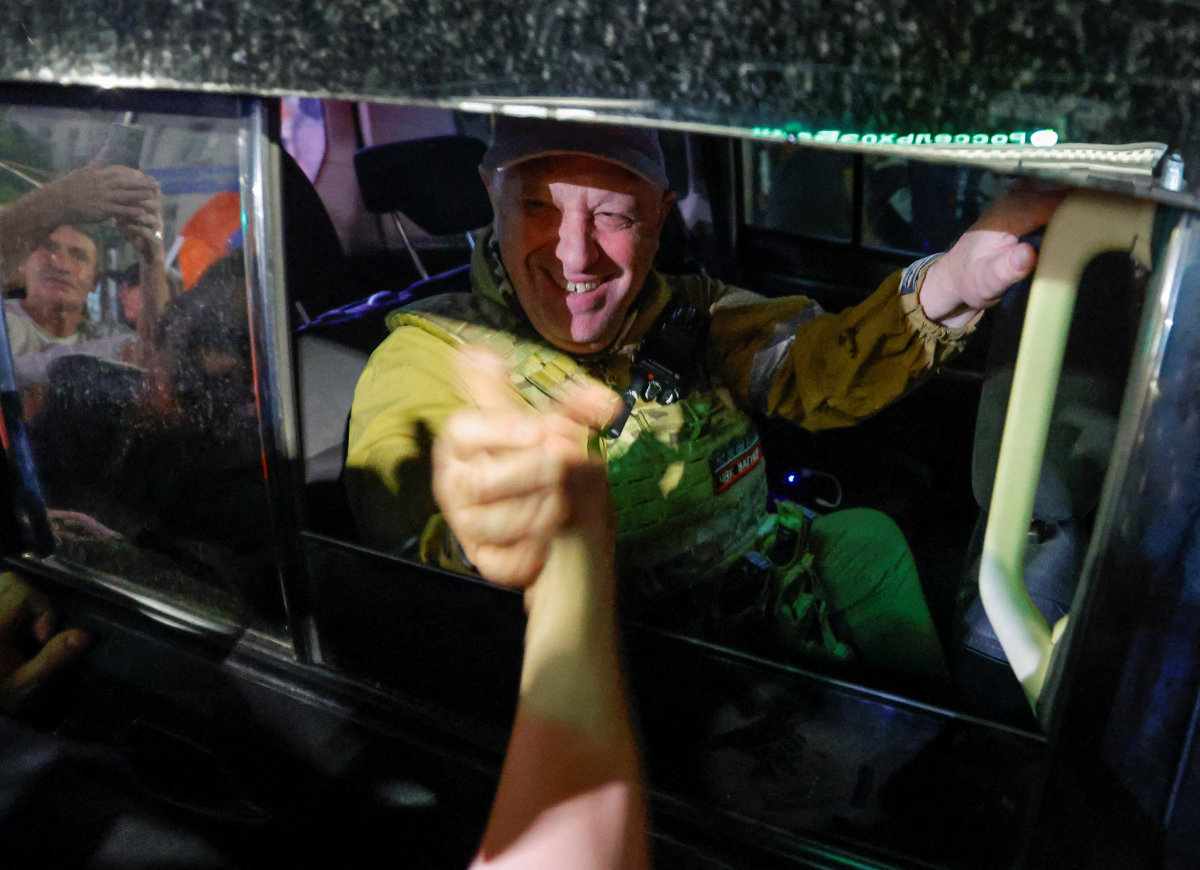
Wagner mercenary chief Yevgeny Prigozhin leaves the headquarters of the Southern Military District amid the group's pullout from the city of Rostov-on-Don, Russia, on June 24, 2023. (REUTERS)
Wagner troops and equipment also were in Lipetsk province, about 360 kilometers (225 miles) south of Moscow.
Authorities declared a “counterterrorist regime” in Moscow and its surrounding region, enhancing security and restricting some movement. On the southern outskirts, troops erected checkpoints, arranged sandbags and set up machine guns. Crews dug up sections of highways to slow the march.
Moscow Mayor Sergei Sobyanin declared Monday a non-working day for most residents as part of the heightened security, a measure that remained in effect even after the retreat.
The dramatic developments came exactly 16 months after Russia launched its full-scale invasion of Ukraine, Europe’s largest conflict since World War II, which has killed tens of thousands, displaced millions and reduced cities to rubble.
Ukrainians hoped the Russian infighting would create opportunities for their army to take back territory seized by Russian forces.
Ben Barry, senior fellow for land warfare at the International Institute for Strategic Studies, said that even with a deal, Putin’s position has probably been weakened and “these events will have been of great comfort to the Ukrainian government and the military.”
Ukrainian President Volodymyr Zelensky said late Saturday, shortly before Prigozhin announced his retreat, that the march exposed weakness in the Kremlin and “showed all Russian bandits, mercenaries, oligarchs” that it is easy to capture Russian cities “and, probably, arsenals.”
Switching into Russian in his daily video address, Zelensky said “the man from the Kremlin” was “very afraid.” He repeated his calls for the West to supply Ukraine with F-16 fighter jets and ATACMS tactical ballistic missiles.
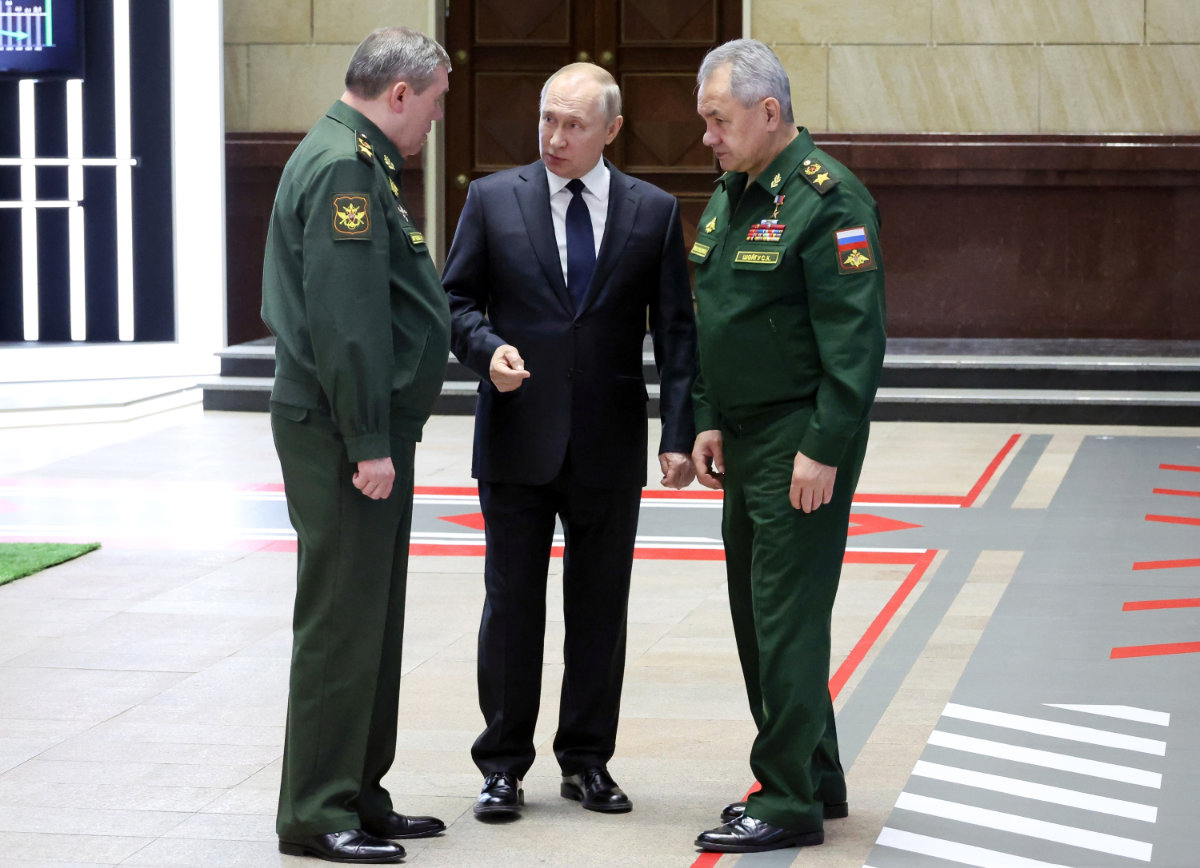
Russian President Vladimir Putin, center, speaks with Russian Defense Minister Sergei Shoigu (right) and Chief of the General Staff Gen. Valery Gerasimov (left), after a meeting with senior military officers in Moscow on Dec. 21, 2022. Shoigu's has been the target of Wagner leader Yevgeny Prigozhin's ire. (Kremlin Pool Photo via AP, File)
Prigozhin had vowed earlier that his fighters, whom he said number some 25,000, would not surrender because “we do not want the country to live on in corruption, deceit and bureaucracy.”
“Regarding the betrayal of the motherland, the president was deeply mistaken. We are patriots of our homeland,” he said in an audio message on his Telegram channel.
He posted video of himself at the military headquarters in Rostov-on-Don and claimed his forces had taken control of the airfield and other military facilities in the city without any deaths or even “a single gunshot.”
Russian media, however, reported that several helicopters and a military communications plane were downed by Wagner troops. The Kremlin referred a question about the losses to the Defense Ministry, which has not commented.
The short-lived rebellion came as Russia is “fighting the toughest battle for its future,” Putin said, with the West piling sanctions on Moscow and arming Ukraine.
“The entire military, economic and information machine of the West is waged against us,” Putin said.
State-controlled TV networks led their newscasts with Putin’s statement and reported the tense situation in Rostov-on-Don. Broadcasters also carried statements from top Russian officials and lawmakers voicing support for Putin, condemning Prigozhin and urging him to back down.
Chechnyan strongman Ramzan Kadyrov, who in the past has sided with Prigozhin in his criticisms of Russia’s military, also expressed support for Putin’s “every word.”
“The mutiny needs to be suppressed,” Kadyrov said.
Wagner troops have played a crucial role in the Ukraine war, capturing the eastern city of Bakhmut, an area where the bloodiest and longest battles have taken place. But Prigozhin has increasingly criticized the military brass, accusing it of incompetence and of starving his troops of munitions.
In announcing the rebellion, Prigozhin accused Russian forces of attacking the Wagner camps in Ukraine with rockets, helicopter gunships and artillery. He alleged that Gen. Valery Gerasimov, chief of the General Staff, ordered the attacks following a meeting with Shoigu in which they decided to destroy the military contractor.
The Defense Ministry denied attacking the camps.
The 62-year-old Prigozhin, a former convict, has longstanding ties to Putin and won lucrative Kremlin catering contracts that earned him the nickname “Putin’s chef.”
ALSO READ: The mercenary chief who urged an uprising against Russia’s generals has long ties to Putin
He gained attention in the US when he and a dozen other Russian nationals were charged with operating a covert social media campaign aimed at fomenting discord ahead of Donald Trump’s 2016 presidential election victory. Wagner has sent military contractors to Libya, Syria, several African countries and eventually Ukraine.
The rebellion appeared likely to further hinder Moscow’s war effort in Ukraine, as Kyiv’s forces probed Russian defenses in the initial stages of a counteroffensive.
Orysia Lutsevych, the head of the Ukraine Forum at the Chatham House think tank in London, said the infighting could create confusion and potential division among Russian military forces.
“Russian troops in Ukraine may well now be operating in a vacuum, without clear military instructions, and doubts about whom to obey and follow,″ Lutsevych said. “This creates a unique and unprecedented military opportunity for the Ukrainian army.”
Western countries monitored developments closely. US Secretary of State Antony Blinken spoke with his counterparts in the other G7 countries and the European Union’s foreign affairs representative, his spokesman said, adding that Blinken “reiterated that support by the United States for Ukraine will not change.”
Latvia and Estonia, two NATO countries that border Russia, said they were increasing security at their borders.



